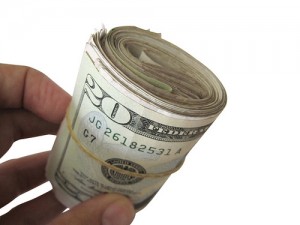 You would be hard pressed to find someone who does not want to earn more money. While many people make enough to pay for their expenses, they still might want to increase their lifestyle, save more, give more to charity, or simply have the satisfaction that they earn more money. But as we all know, the more money that comes in, the more money the government will take from us. So is it worthwhile to work harder to bring in more money?
You would be hard pressed to find someone who does not want to earn more money. While many people make enough to pay for their expenses, they still might want to increase their lifestyle, save more, give more to charity, or simply have the satisfaction that they earn more money. But as we all know, the more money that comes in, the more money the government will take from us. So is it worthwhile to work harder to bring in more money?
In the United States the tax system is tiered. Those who earn very little will not only pay a small amount of dollars, they will also pay a small percentage of their income. Those who are the higher earners will pay a much larger amount, and a larger percentage of their income. The exception is of course the extremely wealthy who are able to take advantage of many tax shelters and reduce the percent of their income paid in taxes. If you want to know the exact numbers, here is an easy to read tax table, and an extremely difficult to read one from the IRS.
So how does that fare in the real world in 2012? Suppose you are single and you earn exactly $25,000 and make no qualified plan contributions. You will receive the standard deduction of $5,950 leaving you with a taxable income of $19,050. You will end up paying $2,422 in taxes, or about 9.7% of your $25,000 earnings. Now if you want to increase your wages and make more money this year, you take on an extra job and earn exactly $25,000 more, you will have $50,000 to report. Take off the standard deduction and your taxable income is $44,050. You will pay $7,042 in taxes, or about 14.1% of your earnings. These are claiming 0 personal exemptions. You can do calculations with your own income here.
In our example income doubled, and taxes increased barely over 4% (the calculation does not take into account state or local taxes; only federal). By earning twice as much, take home pay went from $22,578 to $42,958. While it would be nice to make twice as much, and take home twice as much, that is not the way our system works. You have to decide if the increased taxes owed are worthwhile.
Earning more money is great. But too many people get caught up with the fact that the more money they bring home, the more they will have to pay in taxes. The bottom line is that when you bring home more money, you have more money. The key is determining how much harder you want to work, and how much that extra work is worth to you. By increasing your take home pay you can save more, give more away, and overall feel good knowing that you worked hard, and you now have extra money in your pocket to do with whatever you would like.

I agree, there is a balance to be had in regards to how hard you want to work versus how much you want to make. In general, of course, it is usually better to make more money as long as you’re doing it with taxes in mind and putting yourself in the best possible situation. It’ll be interesting to see what changes will come into play with the “financial cliff” that is looming.
I think you explained it well and I often get annoyed/shocked at when people think they actually make LESS money due to taxes if they go up in tax brackets. There is a huge misconception that ALL of your income gets taxed at the new/higher bracket but that’s simply not the case.
I agree with the above commenter’s that too many people have a misbelief that is not worth it to earn more money because they will be paying more taxes. As you have pointed out, the increase in taxes is not that great. It’s most likely even less when you take into account deductions that you can take.
I agree with the previous comments – I think a lot of people get confused by tax brackets. Being in a higher bracket doesn’t mean your entire income is taxed more.
I have often asked this question myself. There is a fine line of when you make more or lose more. My hubby and I are both in the top 2 tax brackets so we pay a fair share. We would have to have a substantial pay increase to make the increase worth it.
The rich don’t just have a lower bill because of tax shelters. It’s because the US has a regressive taxation structure — a lot of taxes, e.g. Social Security, disappear at a certain marginal level for each dollar earned beyond.
As a general rule, marginal taxes do nothing to dissuade people from working harder, so long as the marginal rates are reasonably low. Of course, Americans should use their wonderfully complex, loopholed tax system to their advantage. Setup a corporation, pay yourself dividends! Enjoy the same advantages as rich people.
If you setup a corporation and pay dividends to yourself, you first pay corporate income taxes and then taxes on the dividends. There’s no free lunch there.
I love your statement, “when you make more money, you have more money.” Our taxes are unbelievably low in comparison with most of the developed world, don’t worry about the extra taxes!